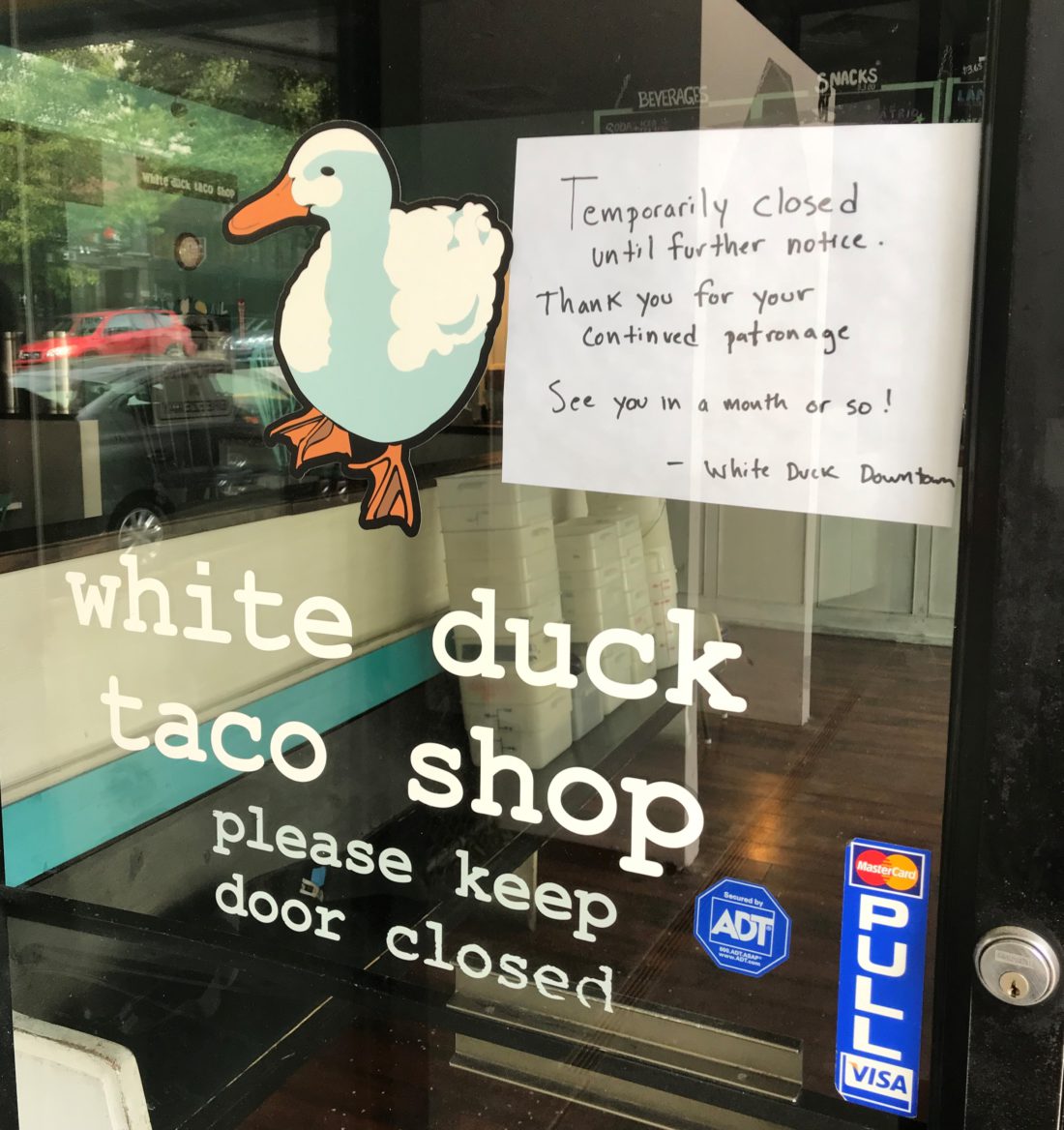AVL Watchdog is a nonprofit news team producing stories that matter to Asheville and Buncombe County.
By Mark Barrett
When the Rev. Tami Forte Logan learned that the Buncombe County Tourism Development Authority and allies won legislative approval to offer $5 million to small businesses crushed by the COVID-19 pandemic, she didn’t join the chorus of congratulations.
“This bill is making sure that the hoteliers don’t fall, making sure that they will be OK,” said Forte Logan, a leader in Faith 4 Justice Asheville, which advocates for racial equity. “But what about the people? I don’t see how this will trickle down to the workers who are being hit the hardest.”
The grant money is available to restaurants, retailers, breweries, art galleries and other small businesses that in the judgment of the TDA will “significantly increase patronage of lodging facilities in Buncombe County” when they reopen, the legislation says.
The bill and the question of who really benefits from it are just the latest topics in an ongoing debate over whether the TDA, with its mission to bring ever more overnight guests to Buncombe County, is good for county residents — or just good for the hotel industry that has controlled it since its inception nearly four decades ago.
The coronavirus relief bill was backed by the TDA and hotel industry and steered through a short session of the state’s General Assembly by Sen. Chuck Edwards, R-Henderson, whose district includes part of Buncombe County. The $5 million will come from a TDA-controlled pot of money that ordinarily goes to capital projects like parks, historic sites, greenways and athletic fields that draw more visitors to Buncombe County but also typically benefit local residents.
That’s a sore point with some critics, who say the money should instead come from a larger, separate TDA fund for marketing and advertising to lure tourists here, which some characterize as a direct subsidy to the hotel industry. The new legislation won’t touch that fund.
Money in both funds comes from the 6% hotel room tax levied by Buncombe County.
Who benefits?
“Everything about this benefits the hotel industry,” Forte Logan said in a phone interview. “It feels incestuous, recycling money within the same group. It begins with the hoteliers and stays with the hoteliers.”
Keaton Hill, also a leader of Faith 4 Justice Asheville, said the grant program is a step in the right direction. But she lodged a similar complaint in recent remarks to county commissioners.
“Hoteliers have profited greatly off of workers, but there are zero dollars being allocated for workers,” she said.
The measure’s supporters, however, say grants to tourism-dependent businesses will have a long-term impact by enabling them to reopen and re-employ workers. The money is to go to businesses that were shut down by the pandemic.
The $5 million would be exhausted in just a few weeks if given directly to workers, “then that money’s gone,” said Jim Muth, a former TDA chairman who helped put the legislation together. “If you’ve got businesses opening, it’s a sustainable thing.”
Muth said that if the $5 million had come from marketing funds, it would have been impossible to rush the measure through a General Assembly where the hospitality industry has a huge say over bills affecting how room tax money is spent.
“We could never have gotten it through the legislature if we were just going to give [the money] to people,” he said.
The bill’s language was added to one of two broad measures to deal with the coronavirus pandemic and its aftermath. The measures were approved in a lightning-quick legislative session that began April 28 and ended May 2. Gov. Roy Cooper signed them into law May 5.
The TDA board voted April 2 to donate $50,000 to the One Buncombe Fund to help people suffering financially from the pandemic. That money comes from other sources beside the room tax. Critics describe it as a token gesture given the TDA’s significant cash reserves, which topped $13 million at the end of March.
Mountain BizWorks, an Asheville-based nonprofit that makes loans and provides advice and assistance to small businesses, will administer the grant program, although final awards will be made by the TDA board. Grants will be no larger than $50,000 and will go to businesses with 2 to 200 employees. The TDA board has agreed that it won’t be involved in evaluating the applications or in the disbursements of the funds, delegating that to Mountain BizWorks. The legislation, however, stipulates that successful applicants for the grants must engage in operations that “significantly increase patronage of lodging facilities in Buncombe County.”
The formal application process for grants is scheduled to begin May 15. Noah Wilson of Mountain BizWorks said 391 businesses had expressed interest as of May 11.
A sacrifice?
Use of room tax proceeds, budgeted to be about $27 million in the current fiscal year, has become more controversial in recent years as some residents tire of what they see as the negative impacts of the TDA’s successful efforts to boost the number of visitors to Asheville and Buncombe County.
“It’s very frustrating for so many not to benefit from these tax revenues while we’re left to deal [with] the added congestion, infrastructure upgrades, and relentless and short-sighted hotel development,” Asheville resident Heath Moody wrote the TDA recently.

Three-quarters of the room tax revenue goes into the fund that is used solely for marketing and advertising Buncombe County and Asheville as a tourist destination. The rest goes into a Tourism Product Development Fund, which pays for construction projects likely to make Buncombe County more attractive to tourists who will populate area hotels. Past examples include renovations to Harrah’s Cherokee Center – Asheville, soccer fields and transportation improvements in the River Arts District.
The state law enabling Buncombe County to tax tourists dates to 1983. From the beginning, it was conceived by the hospitality industry and written in such a way that representatives of the industry maintain near-total control of the tax revenues.
Although Buncombe County levies the 6 percent room tax, county commissioners have no formal say over how proceeds are spent. That power rests with the TDA board, where lodging industry representatives hold six of the board’s nine voting seats by law. Board members are appointed by Buncombe commissioners, Asheville City Council and the Asheville Area Chamber of Commerce.
Two elected officials – one each from the Asheville City Council and the Buncombe County Board of Commissioners – have seats on the TDA board but have no vote by law. City and county officials have pushed for a larger share of the funds to come into their coffers with fewer strings attached, saying increased tourism brings greater needs for law enforcement, street and sidewalk maintenance and other government services.
The legislature’s action earlier this month means city and county governments will get even less of the room tax money in the near future, although projects already awarded room-tax funds will not be affected.
Critics say more of the room tax should go to help local government and residents, not less. Downtown Asheville resident Ashley Cooper told county commissioners that allocating $5 million to help local businesses restart “is a step in the right direction, [but] our community deserves more.”
When state Sen. Edwards announced the $5 million plan, he called hoteliers’ support for the move “one of the most generous, selfless acts I have witnessed coming out of this crisis. For them to dedicate funding to help other businesses, funding that would otherwise go to promote their own, shows their sincerity and commitment to our community.”
Critics scoff at that.
“I wouldn’t call it selfless to take money out of the pockets of residents of Asheville and Buncombe County [earmarked for infrastructure projects] in order to put it into the pockets of residents of Asheville and Buncombe County to support businesses,” former Asheville City Council member Gordon Smith said in an interview.
Hill with Faith 4 Justice said the pandemic will reduce revenues from other sources going to local government. Taking money from a fund they benefit from and giving it to businesses “at a time when tourism advertising is unnecessary” is wrong, she said.
What would hoteliers allow?
Negotiations to change the distribution of room tax revenues have been underway since last year by local government officials, TDA members and hoteliers.
Muth, the former TDA board chairman, said there is an agreement in principle to shift the current formula of 75% for advertising and marketing and 25% for capital investments to a 67/33 split that’s more common among other North Carolina counties. That would mean more money for projects benefiting not just tourists but residents, too.
The timing of the change is uncertain. Muth said legislators could consider the change in this year’s legislative session, scheduled to resume May 18, or next year.
But Muth said it would have been difficult to persuade legislators to take the $5 million just approved for small business grants from the fund the TDA uses for marketing and advertising. State hospitality industry groups, he said, would have opposed it.
And TDA members were told by their attorney, Sabrina Presnell Rockoff, that it would be unconstitutional. Hotelier and TDA board member Himanshu Karvir said in an interview that’s why the $5 million could only come from the Tourism Product Development Fund.
“It’s the appropriate way to do it because it’s the legal way to do it,” he said.
In an interview, Rockoff cited this provision of the state constitution: “Every act of the General Assembly levying a tax shall state the special object to which it is to be applied, and it shall be applied to no other purpose.” In other words, she argued, tax dollars collected for tourism advertising could not be spent on something else.
But Christopher McLaughlin, a professor at the UNC School of Government who specializes in tax law, said the provision is probably irrelevant. He said Rockoff’s argument omits an important point: Buncombe County commissioners, not state legislators, levy the Buncombe room tax.
“There’s nothing in the constitution that somehow limits the use of occupancy tax funds,” he said, as long as it entails a legitimate public purpose. “I don’t think that constitutional provision applies at all because this is a county tax, not a state tax.”
“A court might disagree,” McLaughlin said, adding that it’s unclear who might have standing to bring a lawsuit other than hotel guests who paid the tax.
No court has ruled on the definition of the constitutional provision in nearly a century, said Rockoff, who stands by her interpretation.
Editor’s note: In consultation with AVL Watchdog, this story was updated on May 17 at 8:02 p.m. to correct references to Keaton Hill; Hill identifies as female. Also, additional context was provided to clarify that, while not required by the legislation enabling the Buncombe County Tourism Jobs Recovery Act, the TDA has announced it will contract with Mountain BizWorks, which will review applications for funding, select recipients and disburse the grants.
AVL Watchdog is a nonprofit news team producing stories that matter to Asheville and Buncombe County. Mark Barrett is a veteran freelance journalist focusing on Western North Carolina. AVL Watchdog editor Tom Fiedler contributed to this report. Contact us at avlwatchdog@gmail.com.



“It feels incestuous, recycling money within the same group. It begins with the hoteliers and stays with the hoteliers.”
That has been the whole purpose of the TDA since its beginning. That is why a majority of it is, by law, hotel owners. The TDA is incestuous by definition.
LOL shouldn’t these people petition local county government to disband it? Oh no, they’ll just keep pointing fingers at political opponents to score political points and persuade a dumb population that all that is wrong is doesn’t start here.